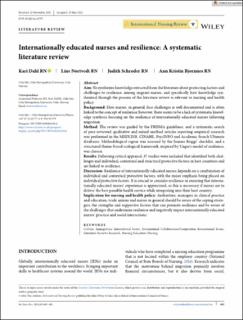Internationally educated nurses and resilience: A systematic literature review
Peer reviewed, Journal article
Published version
Permanent lenke
https://hdl.handle.net/11250/3021372Utgivelsesdato
2022-07-22Metadata
Vis full innførselSamlinger
Sammendrag
Aim: To synthesize knowledge extracted from the literature about protecting factors and challenges to resilience, among migrant nurses, and specifically how knowledge synthesized through the process of the literature review is relevant to nursing and health policy.
Background: How nurses, in general, face challenges is well documented and is often linked to the concept of resilience; however, there seems to be a lack of systematic knowledge synthesis focusing on the resilience of internationally educated nurses following migration.
Method: The review was guided by the PRISMA guidelines, and a systematic search of peer-reviewed qualitative and mixed-method articles reporting empirical research was performed in the MEDLINE, CINAHL, PsycINFO and Academic Search Ultimate databases. Methodological rigour was assessed by the Joanna Briggs’ checklist, and a structured theme-based ecological framework, inspired by Ungar’s model of resilience, was chosen.
Results: Following critical appraisal, 37 studies were included that identified both challenges and individual, contextual and structural protective factors in host countries and are linked to resilience.
Discussion: Resilience of internationally educated nurses depends on a combination of individual and contextual protective factors, with the major emphasis being placed on individual protective factors. It is crucial to consider resilience in ensuring that internationally educated nurses’ experience is appreciated, as this is necessary if nurses are to deliver the best possible health service while integrating into their host country. Implication for nursing and health policy: Authorities, managers in clinical practice and education, trade unions and nurses in general should be aware of the coping strategies, the strengths and supportive factors that can promote resilience and be aware of the challenges that undermine resilience and negatively impact internationally educated nurses’ practice and social interactions.

